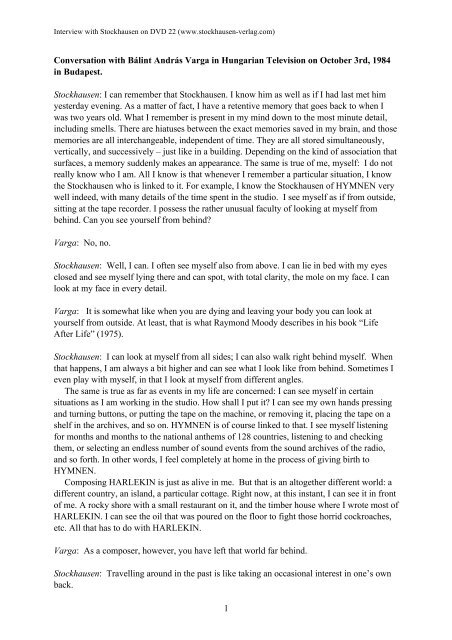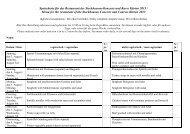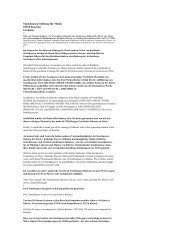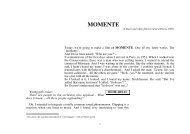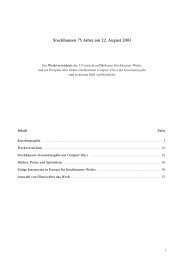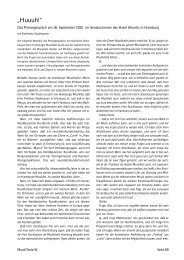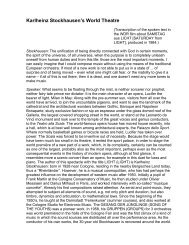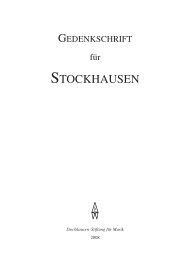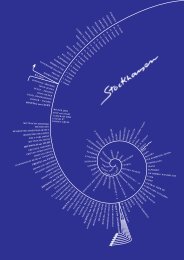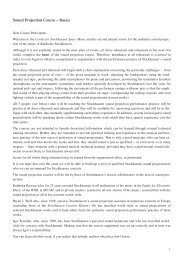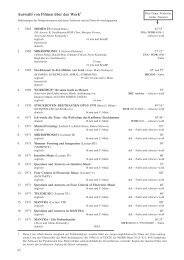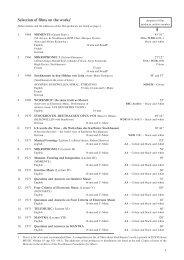HYMNEN DVD 22 English Translation of Stockhausen's Interview
HYMNEN DVD 22 English Translation of Stockhausen's Interview
HYMNEN DVD 22 English Translation of Stockhausen's Interview
You also want an ePaper? Increase the reach of your titles
YUMPU automatically turns print PDFs into web optimized ePapers that Google loves.
<strong>Interview</strong> with Stockhausen on <strong>DVD</strong> <strong>22</strong> (www.stockhausen-verlag.com)<br />
Conversation with Bálint András Varga in Hungarian Television on October 3rd, 1984<br />
in Budapest.<br />
Stockhausen: I can remember that Stockhausen. I know him as well as if I had last met him<br />
yesterday evening. As a matter <strong>of</strong> fact, I have a retentive memory that goes back to when I<br />
was two years old. What I remember is present in my mind down to the most minute detail,<br />
including smells. There are hiatuses between the exact memories saved in my brain, and those<br />
memories are all interchangeable, independent <strong>of</strong> time. They are all stored simultaneously,<br />
vertically, and successively – just like in a building. Depending on the kind <strong>of</strong> association that<br />
surfaces, a memory suddenly makes an appearance. The same is true <strong>of</strong> me, myself: I do not<br />
really know who I am. All I know is that whenever I remember a particular situation, I know<br />
the Stockhausen who is linked to it. For example, I know the Stockhausen <strong>of</strong> <strong>HYMNEN</strong> very<br />
well indeed, with many details <strong>of</strong> the time spent in the studio. I see myself as if from outside,<br />
sitting at the tape recorder. I possess the rather unusual faculty <strong>of</strong> looking at myself from<br />
behind. Can you see yourself from behind?<br />
Varga: No, no.<br />
Stockhausen: Well, I can. I <strong>of</strong>ten see myself also from above. I can lie in bed with my eyes<br />
closed and see myself lying there and can spot, with total clarity, the mole on my face. I can<br />
look at my face in every detail.<br />
Varga: It is somewhat like when you are dying and leaving your body you can look at<br />
yourself from outside. At least, that is what Raymond Moody describes in his book “Life<br />
After Life” (1975).<br />
Stockhausen: I can look at myself from all sides; I can also walk right behind myself. When<br />
that happens, I am always a bit higher and can see what I look like from behind. Sometimes I<br />
even play with myself, in that I look at myself from different angles.<br />
The same is true as far as events in my life are concerned: I can see myself in certain<br />
situations as I am working in the studio. How shall I put it? I can see my own hands pressing<br />
and turning buttons, or putting the tape on the machine, or removing it, placing the tape on a<br />
shelf in the archives, and so on. <strong>HYMNEN</strong> is <strong>of</strong> course linked to that. I see myself listening<br />
for months and months to the national anthems <strong>of</strong> 128 countries, listening to and checking<br />
them, or selecting an endless number <strong>of</strong> sound events from the sound archives <strong>of</strong> the radio,<br />
and so forth. In other words, I feel completely at home in the process <strong>of</strong> giving birth to<br />
<strong>HYMNEN</strong>.<br />
Composing HARLEKIN is just as alive in me. But that is an altogether different world: a<br />
different country, an island, a particular cottage. Right now, at this instant, I can see it in front<br />
<strong>of</strong> me. A rocky shore with a small restaurant on it, and the timber house where I wrote most <strong>of</strong><br />
HARLEKIN. I can see the oil that was poured on the floor to fight those horrid cockroaches,<br />
etc. All that has to do with HARLEKIN.<br />
Varga: As a composer, however, you have left that world far behind.<br />
Stockhausen: Travelling around in the past is like taking an occasional interest in one’s own<br />
back.<br />
1
<strong>Interview</strong> with Stockhausen on <strong>DVD</strong> <strong>22</strong> (www.stockhausen-verlag.com)<br />
I do not believe that history has a direction. Nor does the history <strong>of</strong> a single person. Rather,<br />
all aspects <strong>of</strong> my work appear to me as a circle or a spiral but not along a straight line. I would<br />
never say “What I did ten years ago, I would not do again now”; or: “What I did thirty or<br />
thirty-five years ago, I would not do again.” On the contrary, all aspects are for me valid<br />
possibilities, like stones in a mosaic. It is all more like a whirlpool around my consciousness<br />
and mixed in my consciousness, rather than strung on a chain. In this sense, when composing<br />
a detail <strong>of</strong> a new work, a few bars from a piece I composed twenty-three years before might<br />
emerge in my mind. I would then stop and jot down in the sketch “Remember PUNKTE!” Or:<br />
“Attention! Think <strong>of</strong> the treatment <strong>of</strong> percussion in KREUZSPIEL!”, or something else along<br />
those lines. Things like that sometimes occur in my sketches to remind me <strong>of</strong> particular things<br />
I have found in my life before, because I want to use them and elaborate them further. I<br />
always have the feeling as if I had hit a number <strong>of</strong> billiard balls: they are rolling somewhere,<br />
will rebound to me, and then I have to hit them again to bring about new constellations. All<br />
my life is a reservoir <strong>of</strong> possibilities that I can use again at any time.<br />
Varga: In commenting on the third region <strong>of</strong> <strong>HYMNEN</strong>, you refer to it as an experiment you<br />
conducted to find out whether well-trained musicians could make music the way you expected<br />
them to. How did it work out at the time, in 1971 in New York?<br />
Stockhausen: Five rehearsals <strong>of</strong> two hours each. The outcome was rather an approximation.<br />
Owing to the fact that many musicians in the orchestra were good at faking, the listeners had<br />
the impression that the piece was meant to be the way it sounded.<br />
Varga: How about now?<br />
Stockhausen: Now it is far more accurate. I would never again accept an engagement with an<br />
insufficient number <strong>of</strong> rehearsals. Here in Hungary, I was given three 8-hour days <strong>of</strong> sectional<br />
rehearsals, and three days <strong>of</strong> tutti-rehearsals—for the first time ever. In the past, all I had were<br />
two days <strong>of</strong> sectional rehearsals, and two days <strong>of</strong> tutti-rehearsals in addition to the dress<br />
rehearsal and concert. Here we have had three days <strong>of</strong> sectional rehearsals, and three days <strong>of</strong><br />
tutti rehearsals, plus dress rehearsal and concert. And I needed every single minute, since I<br />
used all that time to work on details.<br />
Alas, up until now, I have never gotten anywhere near the original concept <strong>of</strong> the work,<br />
which is that the musicians ought to know the tape so thoroughly as to be able to react to what<br />
they hear. Actually, whatever has been played for the past thirteen years has also been nothing<br />
but cheating. I cheat, too, together with the musicians. In other words, after so many years <strong>of</strong><br />
futilely trying to acquaint the musicians with the tape, I have now written cue notes in the<br />
parts, with the events on the tape written in small notes. This morning, I was angered by two<br />
bassoonists who played a fragment far too early, before the corresponding passage had been<br />
heard on tape, simply because it was written in the parts!<br />
There has been an unsound development in performance practice, which forces musicians<br />
into a corset, due to the limited number <strong>of</strong> rehearsals. As a result, I have made a virtue out <strong>of</strong><br />
necessity and written cue notes <strong>of</strong> what is happening on the tape into the parts. The musicians<br />
improvise with the material that is written, even though they ought to be relying on their ears,<br />
just as in other pieces that I wrote between 1968 and 1970. In KURZWELLEN, SPIRAL,<br />
POLE or EXPO, you react to music that you never heard before: you listen to the radio and<br />
elaborate it further.<br />
2
<strong>Interview</strong> with Stockhausen on <strong>DVD</strong> <strong>22</strong> (www.stockhausen-verlag.com)<br />
The players, then, should be reacting to the tape, after having listened to it for so long and<br />
so <strong>of</strong>ten that they have absorbed it sufficiently to communicate with it, to transform the<br />
recorded musical material. In doing so, they ought to be able to rely on the art <strong>of</strong><br />
improvisation, guided by certain symbols. But the goal is a kind <strong>of</strong> music which, given<br />
orchestral practice today, has no chance <strong>of</strong> materialising, unless there is a capable student<br />
orchestra with which one can study the piece for half a year, meeting twice a week. Each<br />
player could receive a cassette <strong>of</strong> <strong>HYMNEN</strong> and seek motivic material that appeals to him or<br />
her. This could then be elaborated further and in the process, the musicians can find their<br />
bearings – also in what their colleagues are doing. However, the cue notes have done away<br />
with the prospect <strong>of</strong> that ever happening.<br />
Basically, no musician is interested any more in what another musician sitting right next to<br />
him or her is doing. Instead, they are like soldiers: they sit in a row and do what they are told<br />
to do.<br />
Varga: A frustrating situation for you…<br />
Stockhausen: Yes. However, much <strong>of</strong> what I have done in my life has a futuristic element to<br />
it. Most <strong>of</strong> my work has to do with a musical situation that does not yet exist.<br />
Varga: In one <strong>of</strong> your writings, you describe how the performances <strong>of</strong> your music in Osaka<br />
lost some <strong>of</strong> their intensity <strong>of</strong> concentration and radiation once you had left. I wonder whether<br />
as a musician, you feel rather lonely once in a while. A Christ figure betrayed by his disciples.<br />
Stockhausen: That sounds far too dramatic. I admit, though, that during my life I have lost<br />
some friends, some beloved friends. They made music with me and at some point seemed to<br />
believe, for reasons I cannot fathom, that the only way they could get rid <strong>of</strong> me was to kick<br />
me in the backside. It appears as though there is sometimes no other solution but to hit me<br />
from behind. I do not wish to mention names. But there must be something in my personality<br />
that makes some musicians eventually feel claustrophobic in my presence: they need more<br />
space for themselves. Instead <strong>of</strong> leaving in peace (or, as I always put it, by means <strong>of</strong><br />
considerate divorce), they make a crash-landing. I do not like that at all.<br />
Divorce is legitimate, it is feasible, and it can be the right thing to do, but it must be<br />
executed with empathy, charm and humour. In other words, there is a correct way <strong>of</strong> ending a<br />
relationship before starting a new one. However, that presupposes a cultivation <strong>of</strong> the heart<br />
and mind—something you cannot expect automatically. Some manage it, others do not. It is a<br />
mystery and one should make no judgement about it.<br />
I had had more than three hundred rehearsals and gave many concerts over six years – left<br />
me. He had told me a number <strong>of</strong> times: “With you I cannot earn enough money, I could be<br />
making a great deal more. Nor will I rehearse so much in future. You make one rehearse far<br />
too much and it is always so arduous; you must understand that; you had better find someone<br />
else.” I replied: “All right, but please do honour the engagements for which you have signed<br />
contracts. After all, I cannot make another three hundred rehearsals with a new singer within<br />
the next year, and I do not have another one anyway.” But he said no. The <strong>of</strong>fers he was<br />
receiving from the Met, from Bayreuth and a number <strong>of</strong> other opera houses and orchestras<br />
were too alluring for him to refuse. He is already the third singer in my opera<br />
DONNERSTAG aus LICHT to have left in discord.<br />
3
<strong>Interview</strong> with Stockhausen on <strong>DVD</strong> <strong>22</strong> (www.stockhausen-verlag.com)<br />
The conventional world has far more to <strong>of</strong>fer than my music can. Actually, my music has<br />
little to <strong>of</strong>fer apart from work and usually about one tenth <strong>of</strong> the income that singers <strong>of</strong><br />
traditional music can earn, once they have made names for themselves. Difficult.<br />
Varga: Don’t you see yourself as a pioneer <strong>of</strong> music history since World War II? As such,<br />
you may make it hard for others to keep pace.<br />
Stockhausen: Yes, it seems so. Your question suggests that there is this prototype that is put<br />
forward again and again: this Stockhausen, born into a particular historical situation that<br />
brings with it a technological and aesthetic explosion. This composer is supposed to be<br />
playing a role—that <strong>of</strong> creating works, each <strong>of</strong> which is supposed to be a model, accepted by<br />
the others as such. That is also why he plays this part <strong>of</strong> a pioneer.<br />
It is as if one was deployed in a war to fight on a perilous front– you are stuck there, you<br />
have no other choice. You simply go on.<br />
It is true that I have an adventurous nature but I am also very pedantic. The combination <strong>of</strong><br />
the artist and the scientist in me has perhaps produced a kind <strong>of</strong> composer that has been absent<br />
for a long time. I am to play this role and it is therefore difficult, apparently, to find likeminded<br />
companions, people who gladly come with me, even though it can be hard-going.<br />
Varga: May I finally ask you a difficult question: What is music’s role in our lives?<br />
Stockhausen: Music is the most sublime art to connect spirits through its oscillations, its<br />
sound oscillations. Music is the most insubstantial material, the purest material, which directly<br />
impregnates the soul and the spirit—which shapes our spirit.<br />
I believe that mankind will eventually arrive at a state where everyone will be a musician.<br />
People will then communicate with one another by means <strong>of</strong> highly differentiated music in<br />
which we shall no longer be barking and howling (or perhaps just occasionally). Instead, for<br />
the most part we shall be communicating with one another as supremely differentiated singing<br />
and instrumental artists.<br />
To be a musician is the ultimate that can be learned on this planet.<br />
4


